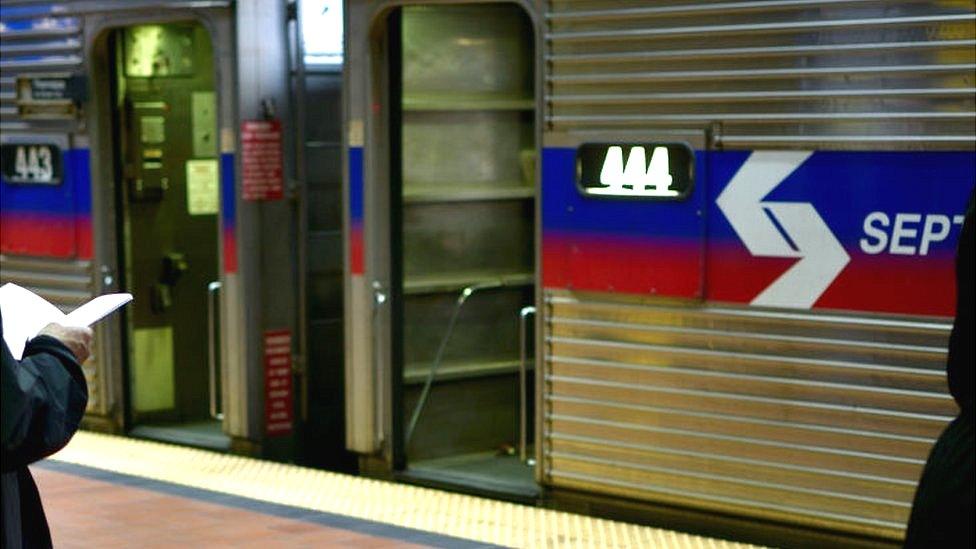Charges ‘unlikely’ for bystanders who failed to report rape say prosecutors
- Published

Bystanders who stood by and failed to help a woman raped on a Philadelphia commuter train last week are unlikely to face criminal charges, local prosecutors say.
CCTV cameras show that bystanders on the train "did nothing" as the assault took place, transport officials said.
Police had suggested earlier that commuters who may have filmed the incident could be prosecuted.
A man was arrested for the incident and now faces rape charges.
The alleged rape took place last Wednesday on a train belonging to the Southeastern Pennsylvania Transportation Authority (Septa). In a statement, Septa said that "there were other people on the train who witnessed this horrific act, and it may have been stopped sooner if a rider called 911".
A Septa employee who boarded the train called police, who found the victim and took the suspect into custody.
The suspect - identified as 35-year-old Fishton Ngoy - now faces rape and several other criminal charges.
The victim was taken to hospital and is working with police.
At a news conference on Monday, police said that they do not believe any witnesses called 911 as the woman was harassed and eventually raped over the course of more than 40 minutes.
It is unclear how many other passengers were in the train car when the incident took place.
Investigators are also looking into whether some bystanders filmed the assault as it was taking place.
"I can tell you that people were holding their phone up in the direction of this woman being attacked," Septa police chief Thomas J Nestel said on Monday.
"What we want is everyone to be angry and disgusted and to be resolute about making the system safer," Mr Nestel added.
Timothy Bernhardt, superintendent of the Upper Darby Police Department, was quoted by the New York Times as saying that bystanders who failed to help could face criminal charges if they recorded the incident.
A final decision on potential criminal charges, he said, will rest with the Delaware County district attorney's office once it completes an investigation.
While Mr Bernhardt did not specify what charges witnesses could face, he said it would be "very difficult to bring charges against those" who saw the attack but did not help.
In response to questions from the BBC, a spokesperson for the district attorney's office said that while an investigation is ongoing, "at the present time there is no expectation that charges will be brought against any passengers."
Kevin McMunigal, a former federal prosecutor and law professor at Case Western Reserve University, told the BBC that in most US states bystanders are under no legal obligation to intervene or help unless they have a "specific duty" to do so, such as parents, teachers, caretakers or police officers.
Mr McMunigal said he believes cases such as the one in Philadelphia are a rarity.
"In the vast majority of situations that come to public attention, the person has done something, or at least called 911," he said.
Tamara Rice Lave, a law professor at the University of Miami, said that it is possible - but unlikely - that prosecutors could charge bystanders who film crimes if the act of filming was found to have had an impact on the crime, or encouraged the criminal.